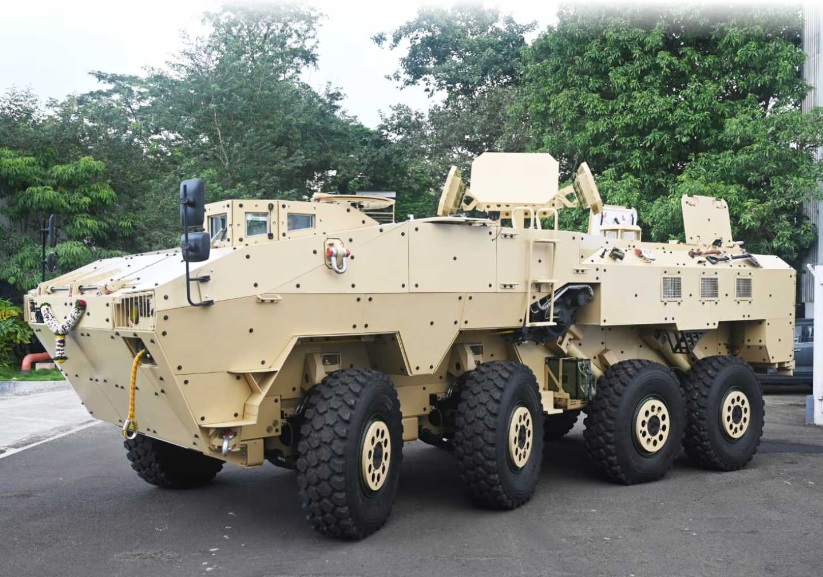Tata Advanced Systems Limited (TASL) announced on Monday that it has entered into a strategic agreement with Morocco’s Royal Armed Forces to locally assemble wheeled armoured platforms (WhaP 8×8) at its defense manufacturing unit in Casablanca, Morocco.
The Defence Research and Development Organisation (DRDO) has collaborated with TASL to develop the platform.
The WhaP 8×8 is a lightly armored, amphibious, and wheeled vehicle. In addition to its primary function as a troop carrier, the vehicle is available in a variety of variants, such as mobile command posts, reconnaissance vehicles for the chemical, biological, radiological, and nuclear (CBRN) battlefield, amphibious reconnaissance, and as an armoured ambulance.
“This will be the first large defense manufacturing plant in Morocco and the first defense manufacturing plant established outside of India by an Indian defense original equipment manufacturer (OEM),” stated a spokesperson for TASL.
It is anticipated that African militaries will acquire the WhaP 8×8 due to its affordability, versatility, protection, and size.
“This contract is of strategic importance to us and is of considerable size.”TASL CEO Sukaran Singh stated that this not only allows TASL to assist in the establishment of Morocco’s defense ecosystem, but also serves as a gateway for TASL to expand into the rest of Africa with specific defense systems.
Singh stated that TASL’s local unit will manufacture a substantial quantity of the specialized vehicle systems for Morocco and, potentially, for other African countries.
Although the initial contracted quantity is exclusively intended to satisfy the Royal Moroccan Army’s requirements, this facility will be a 100% subsidiary of TASL and serve as an export hub to accommodate the needs of other countries, particularly those in Africa.
The armoured vehicle is a successful illustration of partnership between the private and public sectors in India, as well as within the Indian private sector, as a result of the collaboration between DRDO and TASL for WhaP 8×8.
It was noted by senior government officials that this contract is in direct alignment with Prime Minister Narendra Modi’s geostrategic strategy of fostering close relationships with African nations, which are experiencing a reduction in their weapons supply lines from Russia, as well as an unwelcome aggressiveness from new suppliers such as China and Turkey.
The defense verticals of several Tata group companies, such as Tata Motors and Tata Power (Strategic Engineering Division), were merged to form TASL.
Manufacturing facility
The WhaP 8×8 production facility in Morocco is anticipated to be operational within the next 12 months in order to fulfill the contracted quantity of units. This is necessary to fulfill Morocco’s obligations regarding local employment, value addition, and support, as a substantial portion of the platform will be exported from India. A 20,000 square meter production facility in Casablanca has been identified.
Operational capabilities of WhaP
The WhaP 8×8 weighs between 20 and 27 tonnes, contingent upon the variant. Variants that weigh less than 24.5 tonnes may be amphibious, meaning they can float in order to traverse a river or lake.
Modular protection is provided to the WhaP 8×8 crew members through bolt-on, retrofittable panels that shield them from small arms bullets. The floor can be reinforced to withstand the impact of an improvised explosive device (IED).
Its primary armament is a 30 mm cannon, which is mounted on a gun turret with an upgraded sighting system. The DRDO is collaborating with Bharat Electronics Ltd (BEL) to develop the gun turret.
The WhaP 8×8 is equipped with cutting-edge technologies, including a high-power, integrated power pack with automatic transmission, as well as modularity and scalability that can be easily customized to accommodate the diverse missions and operating conditions of Morocco’s Royal Armed Forces.
Tata Advanced Systems will collaborate with the Moroccan government to establish a robust ecosystem that includes the training and skill development of the workforce, the establishment of related capabilities, and the maintenance of the systems in-country. This will involve engaging with local supply chain partners and vendors. Additionally, the facility will comply with international best practices by implementing global standards, according to the spokesperson for TASL.
